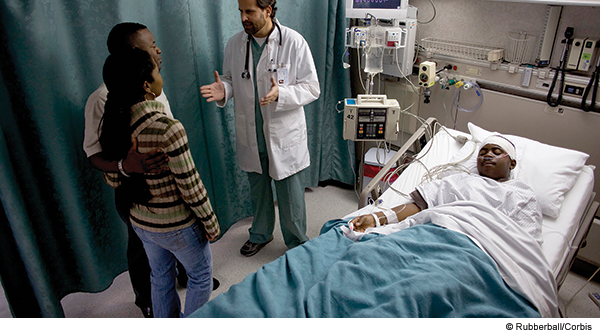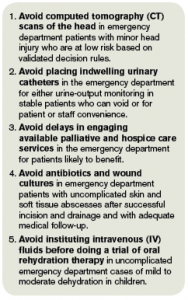
During ACEP’s annual conference in Seattle last fall, the College released its five recommendations for inclusion in the Choosing Wisely campaign. These recommendations were the culmination of almost two years of dialogue with members and a structured process undertaken by an expert panel of practicing emergency physicians and experts in cost-effectiveness, quality, patient safety, and clinical processes.1
Explore This Issue
ACEP Now: Vol 33 – No 05 – May 2014The mission of Choosing Wisely—a multiyear effort of the ABIM Foundation with more than 80 national, regional, and state medical specialty societies as well as consumer groups—is to promote conversations among physicians and patients about using appropriate tests and treatments and avoiding care when harm may outweigh benefits.
Although the Choosing Wisely campaign has brought renewed attention to critical decision making, our responsibility as emergency physicians extends far beyond these five recommendations and must include patients’ perspectives on the care they receive.

Table 1. The following five Choosing Wisely recommendations were approved by ACEP’s Board of Directors
Shared Decision Making
Shared decision making (SDM) is an important practice in emergency medicine. Although the ED environment poses challenges to communication and decision making, a recent study demonstrated that SDM is feasible and offers benefits to patients in the ED setting.2 Professional training and decision aids for patients can promote the adoption of SDM in the health care setting.3
ACEP’s Code of Ethics for Emergency Physicians states:
To choose and act autonomously, patients must receive accurate information about their medical conditions and treatment options. Emergency physicians should relay sufficient information to patients for them to make an informed choice among various diagnostic and treatment options. Emergency physicians, when speaking to patients and families, must not overstate their experience or abilities, or those of their colleagues or institution.
Table 1 illustrates an approach to SDM regarding diagnostic testing in the ED.
Each of the five issues raised by the Choosing Wisely campaign is amenable to SDM. A conversation between the emergency physician and the patient should bring together the physician’s recommendation combined with the patient’s individual goals and preferences.
Stewardship of Resources
Stewardship of resources is an important professional responsibility. Balancing the responsibility to be wise stewards of resources with the responsibility to make the correct diagnosis in the ED can be challenging. According to ACEP’s Code of Ethics for Emergency Physicians, emergency physicians shall act as responsible stewards of the health care resources entrusted to them.4 The Code of Ethics goes on to explain:
Both society and individual emergency physicians confront questions of justice in deciding how to distribute the benefits of health care and the burdens of financing that care among the various members of the society. Emergency physicians routinely address these issues when they assign order of priority for treatment and choose appropriate diagnostic and treatment resources. In making these judgments, emergency physicians must attempt to reconcile the goals of equitable access to health care and just allocation of health care with the increasing scarcity of resources and the need for cost containment.
A recent article proposed six areas of interventions to reduce the cost of emergency care: laboratory tests, high-cost imaging, medication administration, intravenous fluids and medications, hospital admissions, and post-discharge care.5 Another recent article proposed the development of accountable health communities (AHCos) to review local data on health, quality of care, and costs of care, as well as to create goals and actions to contribute to a sustainable health system.6
Balancing the responsibility to be wise stewards of resources with the responsibility to make the correct diagnosis in the ED can be challenging. According to ACEP’s Code of Ethics for Emergency Physicians, emergency physicians shall act as responsible stewards of the health care resources entrusted to them.
Unique Challenges in Emergency Medicine
Choosing Wisely poses particular ethical considerations in the emergency department, where the patient-physician relationship is unique. Patients do not select the emergency physician who sees them in the emergency department; no prior relationship exists between them.
The ED is a venue of episodic interactions between patients and physicians without the expectation of an ongoing patient-physician relationship such as patients have with primary care providers. In addition to the lack of a longitudinal relationship, patients and emergency physicians interact in a time-limited environment. Emergency physicians must rapidly evaluate, intervene, and diagnose potentially life- and limb-threatening conditions while attempting, when possible, to engage patients and families in a patient-centered SDM process of care.
ACEP’s Choosing Wisely recommendations were developed with a practical understanding of these unique emergency department challenges.
Dr. Marco is professor of emergency medicine at Wright State University Boonshoft School of Medicine in Dayton, Ohio. Dr. Kraus is a resident in emergency medicine at Lehigh Valley Health Network and served as a member of the Cost-Effective Care Taskforce that helped develop ACEP’s recommendations for Choosing Wisely. They both currently serve on the ACEP Ethics Committee.
References
- American College of Emergency Physicians. ACEP announces list of tests as part of Choosing Wisely campaign. American College of Emergency Physicians Web site. Available at: www.acep.org/ClinicalPractice-Management/ACEP-Announces-List-of-Tests-As-Part-of-Choosing-Wisely-Campaign. Accessed April 21, 2014.
- Flynn D, Knoedler MA, Hess EP, et al. Engaging patients in health care decisions in the emergency department through shared decision-making: a systematic review. Acad Emerg Med. 2012;19:959-967.
- Légaré F, Ratté S, Stacey D, et al. Interventions for improving the adoption of shared decision making by healthcare professionals. Cochrane Database Syst Rev. 2010;(5):CD006732.
- American College of Emergency Physicians. Code of ethics for emergency physicians. Revised 2011. American College of Emergency Physicians Web site. Available at: www.acep.org/ClinicalPractice-Management/Code-of-Ethics-for-Emergency-Physicians. Accessed April 21, 2014.
- Venkatesh AK, Schuur JD. A “Top Five” list for emergency medicine: a policy and research agenda for stewardship to improve the value of emergency care. Am J Emerg Med. 2013;31:1520-1524.
- Magnan S, Fisher E, Kindig D, et al. Achieving accountability for health and health care. Minn Med. 2012;95:37-39.
Pages: 1 2 3 | Multi-Page





No Responses to “ACEP’s Choosing Wisely Recommendations Stress Importance of Shared Decision Making in Emergency Medicine”